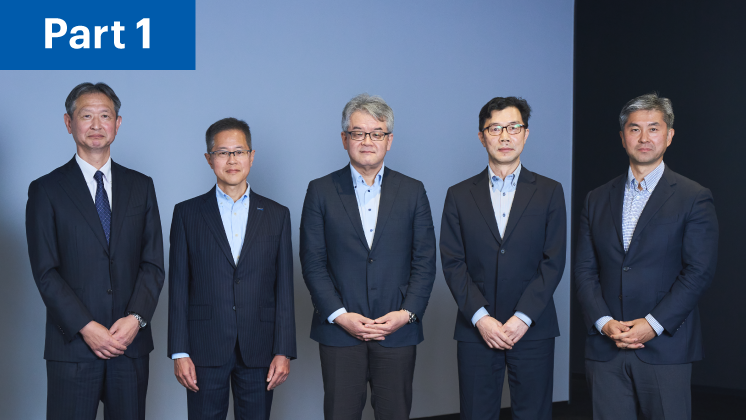
Material-based solutions: A biomass-based polyurethane raw material offering more than just reduction of environmental impact
07/24/24
/ Article on Business Insider Japan
*This English text is a translation of a document originally prepared in Japanese.
*The information, positions and affiliations mentioned in this interview reflect the status at the time of the interview.
Discovering biomass-based materials while pursuing promising performance: Biomass-based polycarbonatediol
The Mitsubishi Chemical Group is developing innovative materials to bring us closer to carbon neutrality. One symbolic material is BENEBiOL™, a biomass-based polycarbonatediol, a raw material for polyurethane.
How does BENEBiOL™ contribute to carbon neutrality? We asked Mitsubishi Chemical Group employees Yoshikazu Kanamori and Kohei Iizuka about its characteristics, applications, and the story behind its development.
The pursuit of advanced features results in a new sustainable material
Polyurethane resins have a wide range of applications, including synthetic/artificial leather for sofas and bags, shoe soles, paints and coatings, and industrial parts such as rubber seals. One of the raw materials for polyurethane resin is polycarbonatediol (PCD), whose properties include water resistance, durability, and chemical resistance. PCD is usually manufactured from petroleum, but the Mitsubishi Chemical Group has developed the world's first biomass-based PCD, branded as BENEBiOL™. This PCD has a biomass-based content of up to 93%.
Yoshikazu Kanamori, who was involved in the development, explained the name. "The 'bene' stands for benefits, the 'bio' refers to biomass-based materials, and the 'ol' comes from polyol, a raw material for polyurethane. The name 'BENEBiOL™' combines these elements."

"Polyurethane products made from BENEBiOL™ offer high durability on par with or even surpassing those made from petroleum-derived materials such as resistance to degradation from chemicals and sebum stains, as well as hydrolysis that creates a sticky sensation. In addition, while conventional polyurethane products often sacrifice flexibility for durability, BENEBiOL™ allows for both," says Kanamori.
Although it may seem that this biomass-based product was developed with environmental concerns in mind, Kanamori explains, "It actually resulted from our pursuit of performance."
"Our original purpose was to achieve the functionalities requested by our customers, such as high durability and a good texture. During our research into non-petroleum materials to meet these requirements, we discovered castor oil, which is extracted from castor bean, a non-edible plant, could be used as one of the raw materials for BENEBiOL™. As a result, using this biomass-based material allowed us to reduce consumption of exhaustible resources such as petroleum and contributes to environmental sustainability by lowering carbon emissions," Kanamori explains.

BENEBiOL™: offering diverse applications from wooden products and wind power to watch bands
BENEBiOL™ serves a wide range of customers, which means it has diverse applications. Kohei Iizuka, who handles BENEBiOL™ sales and marketing, says, "The main applications include synthetic and artificial leathers, coatings, paints, and elastomers. Although end-users may not see BENEBiOL™ directly in the final products, it actually forms the foundation for the quality of polyurethane products.

One example of its use in artificial and synthetic leathers is Toray's Ultrasuede® BX, an environmentally friendly non-woven material with a suede texture. It combines features such as a pleasing texture, excellent durability, breathability, and easy care.
"BENEBiOL™ is highly valued as a raw material for artificial and synthetic leathers due to its flexibility, excellent texture, and durability. While biomass-based materials have often been perceived as lacking durability, BENEBiOL™ offers durability, contributing to a long-lasting quality feel," says Iizuka.

BENEBiOL™ is also promising as a raw material for coating to protect wind turbine blades. It has been selected as an ingredient for the AROLEP® 940 series of wind turbine blade coatings by Spain-based AEROX.
"Wind turbine blades rotate at high speeds, and the leading edge (at the end of the blade) is particularly susceptible to damage from wind and rain. The blades are huge, and their maintenance involves a considerable amount of time and cost. The AROLEP® 940 series, which uses BENEBiOL™, offers superior durability compared to conventional coatings. It provides extremely high resistance to corrosion, even for blades used in offshore wind turbines, which are more susceptible to such damage from harsh weather. This is expected to reduce both maintenance frequency and cost," says Iizuka.
BENEBiOL™ is mainly used in paints for building interiors and furniture.
Lawson, a major Japanese convenience store chain, uses locally sourced lumber for the walls, ceilings, and eaves at its Obihiro Nishi 21-jo Minami 4-chome and Aomori Chuo Koko-Mae stores to reduce carbon emissions and stimulate the local economy. The interior finish coating made with BENEBiOL™ imparts a soft, warm quality to the wood.
Musashi Paint, which supplies Lawson with the interior finish coating made with BENEBiOL™, is a leading global supplier of innovative paint products in a wide range of markets, including architecture, automobiles, furniture, and appliances. A Musashi Paint representative explains why the company chose to use BENEBiOL™.
"With growing interest in environmental issues recently, many customers have requested lower environmental impact from conventional paints. Given this backdrop, we decided to develop environmentally friendly products using biomass-based raw materials. In 2022, we succeeded in developing BioPaint, a high-quality biomass-based coating that combines the latest coating technology with BENEBiOL™," says the representative.
In addition to Lawson, BioPaint is also used by furniture maker FLACE and leather material maker Sanyo Leather.

"BioPaint is praised for being able to replicate the design and physical strength of current paints while using the same equipment and processes. The appeal of BENEBiOL™ lies in its ability to provide new biomass-based value through a wide range of biomass-based content ratios and grades, allowing customization for various applications. We are leveraging these features to propose ideas to different customers to explore a number of joint development projects while gaining their support for our environmentally friendly initiatives," says the Musashi Paint representative.

Courtesy of Citizen Watch
Citizen Watch is using BENEBiOL™ as a raw material for the polyurethane in its watch bands. A Citizen Watch product planner recalls how this came to be.
"When we were looking for environmentally friendly materials, the Mitsubishi Chemical Group suggested biomass-based BENEBiOL™. We conducted multiple years of prototyping and testing before mass production to develop a more suitable material for polyurethane watch bands. Initially, our focus was on environmental considerations. However, during the prototyping process, we found that polyurethane bands made from BENEBiOL™ are more durable than conventional ones. Thus, we were able to create a product that not only addresses environmental concerns but also offers increased durability for long-term use by customers," explains a Citizen Watch product planner.
Citizen Watch decided to use the polyurethane band based on BENEBiOL™ for the PROMASTER, a professional watch with the reliability to withstand harsh environments and the performance demanded in many specialty fields. According to Citizen Watch, the band has garnered a very positive response among customers.
"The first model using BENEBiOL™ sold out almost immediately. Polyurethane bands are typically subject to hydrolysis, which leads to deterioration over time, but by using BENEBiOL™, which is both environmentally friendly and durable, we have created bands that offer superior resistance compared to conventional products and maintain a smooth texture. Our customers have responded positively. As environmental considerations have become a norm today, we believe that we also contributed to establishing a lifestyle of 'valuing and using good products for a long time' through BENEBiOL™," says the Citizen Watch product planner.
Aiming to promote the green specialty material BENEBiOL™

The comments from Musashi Paint and Citizen Watch highlight that environmental considerations are a pressing issue for many companies. There is a growing trend to address these challenges by employing biomass-based materials such as BENEBiOL™.
Iizuka notes, "The global apparel industry is developing environmental information disclosure systems and guidelines. There is increasing concern that if manufacturers do not prioritize environmental considerations, their products may not be accepted in the future. Similarly, in the automotive industry and other sectors, there is a growing demand for biomass-based artificial and synthetic leathers to reduce carbon emissions, for example." He adds that “the construction materials industry for building and furniture also exhibits high environmental awareness. The aforementioned case of Lawson is a prime example of this trend."
"I've observed a rising demand for carbon neutrality and resource recycling in the construction and furniture industries. There is also growing awareness about promoting the use of wood, recycling other materials, carbon neutrality, and biomass-based materials. I’ve heard that companies are incorporating these practices into their ESG management strategies when constructing stores and offices," says Iizuka.
"The Mitsubishi Chemical Group is working to develop solutions to achieve carbon neutrality. As a material contributing to this effort, we aim to make a positive impact on environmental issues with BENEBiOL™. I believe this is a significant initiative of the Mitsubishi Chemical Group, which supplies materials to many customers and is actively promoting Green Transformation (GX)," says Kanamori.
The Mitsubishi Chemical Group's purpose is to "lead with innovative solutions to achieve KAITEKI, the well-being of people and the planet." KAITEKI also represents a philosophy focused on sustainability. More than 10 years ago, the Mitsubishi Chemical Group adopted the KAITEKI philosophy, at the same time it began developing BENEBiOL™. "To achieve KAITEKI, we aim to promote the use of BENEBiOL™," enthuses Iizuka.
The development of BENEBiOL™ began with a pursuit of the advanced functionality and high durability that customers demand. The biomass-based materials, along with their durability and high chemical resistance, ultimately contribute to addressing environmental issues, such as reducing CO2 emissions and curbing the consumption of exhaustible resources like petroleum.
"I want to make biomass-based polyurethane products that can be used safely for a long time readily available anywhere in the world. Additionally, we aim to ensure that when people think of biomass-based polyurethane, they immediately associate it with BENEBiOL™," says Kanamori.
In the near future, we may live in a world where long-lasting, biomass-based polyurethane products are taken for granted. BENEBiOL™ is a new material that could make this vision a reality.
Polycarbonatediol "BENEBiOL™
Mitsubishi Chemical Corporation





